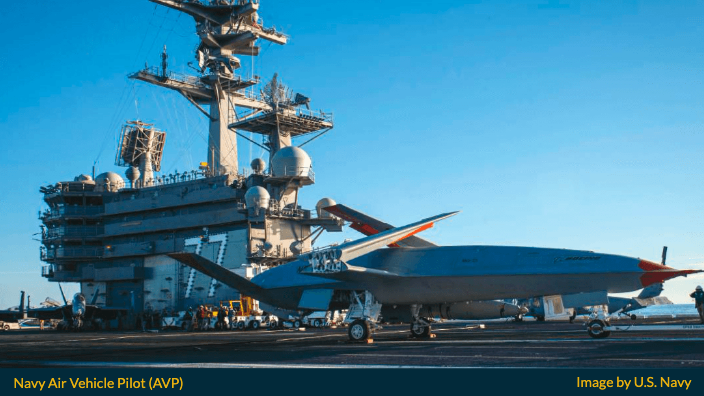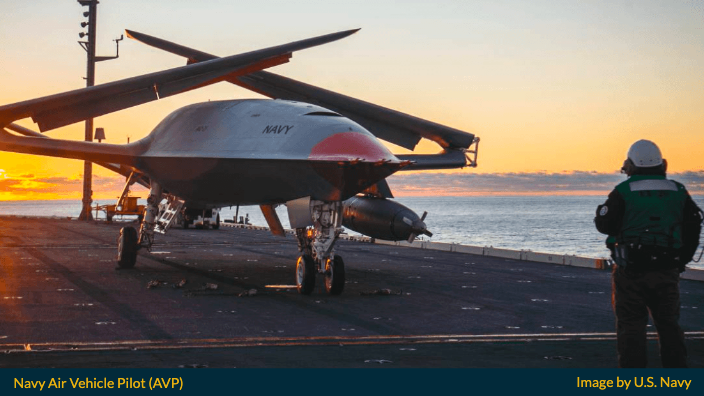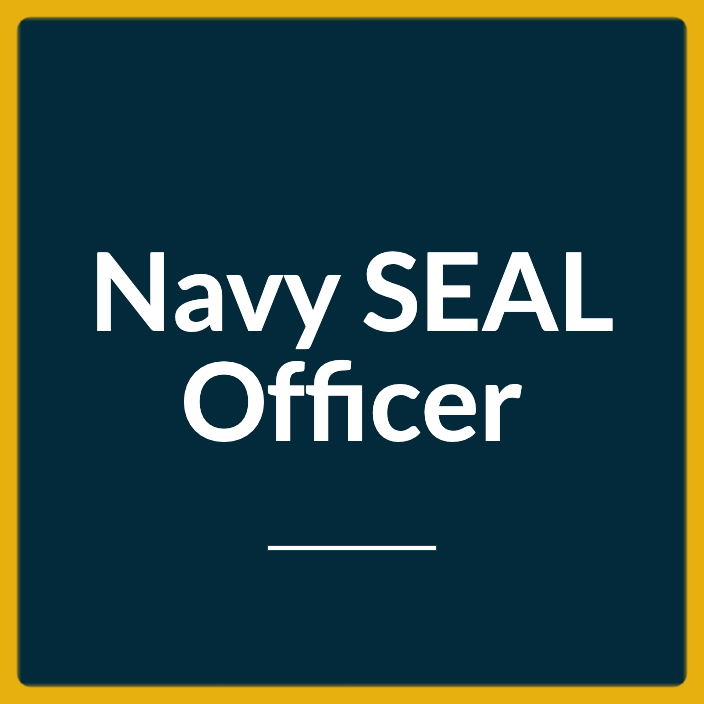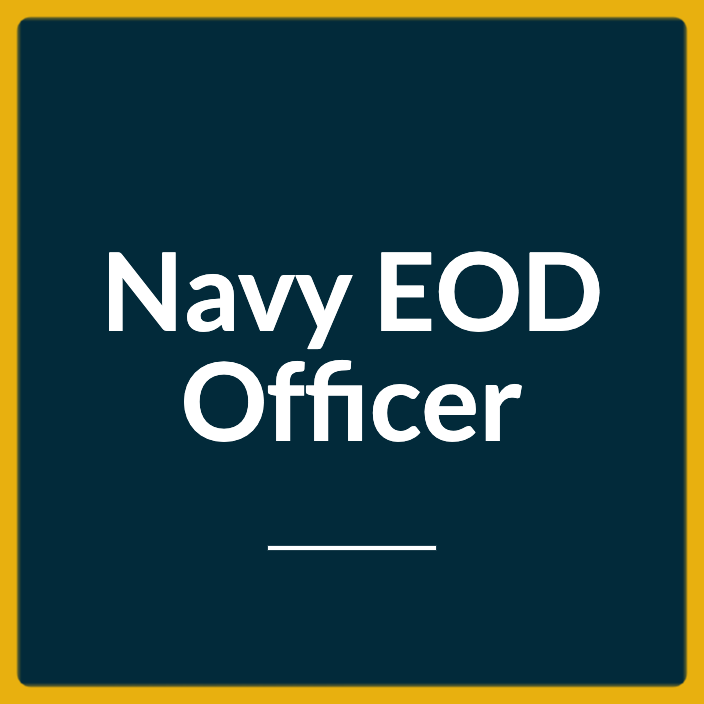Last Updated on March 4, 2024
This guide provides helpful information for those looking to become a Navy Drone Pilot during the Fiscal Year 2024.
The Air Vehicle Pilot (AVP) warrant officer program trains Navy Drone Pilots to fly the MQ-25 Stingray, a carrier-based refueling platform.
Air Vehicle Pilots (otherwise known as Navy Drone Pilots) are Warrant Officers in the Navy who operate the fleet’s Unmanned Aerial Vehicles. Like Navy Aviators, they earn their “wings” for flying these aircrafts.
AVPs will need to have safety of flight technical proficiency and the skills to conduct in-flight refueling. The accession and training pipeline for this program is estimated at 15-18 months (about 1 and a half years).
Program Application
Navy Recruiting Command accepts applications for the AVP program. The initial Air Vehicle Pilot professional recommendation board was held in 2021.
Enlisted Sailors may apply for the AVP program through their career counselors or the nearest officer recruiter.
Interested applicants should contact their career counselor or the nearest officer recruiter for more information on the application process.
AVPs will wear warrant officer/chief warrant officer bars on both collars.
The U.S. Navy is home to some of the most advanced technology in the world. Both civilians and enlisted service members can apply to join the community and take advantage of the many opportunities it offers.
Air Vehicle Pilot

The Secretary of the Navy has approved the establishment of the Air Vehicle Pilot (AVP) warrant officer designator to operate the MQ-25 Stingray, the first carrier-based unmanned aerial vehicle in the Navy.
Warrant Officers were chosen as the main operator source owing to their ability to provide career growth via back-to-back deployments.
The officer designator for Air Vehicle Pilot is 7371.
Unlike traditional Navy Chief Warrant Officers, 7371 warrant officers will be accessed through Navy recruiting instead of conversion of chiefs through a board process.
7371 warrant officers may be certified to operate other unmanned aerial vehicles in the future to fulfill Navy needs.
This signifies the continued agility and flexibility of talent management under Sailor 2025, which seeks to put the right Sailors in the right job.
Warrant Officers
The Navy’s first carrier-based unmanned aerial vehicle, the MQ-25 Stingray, is projected to achieve Initial Operational Capability in Fiscal Year 2025.
The difficulty of running and accomplishing its task from an aircraft carrier causes the use of technical experts.
The Navy plans to train 737X warrant officers as technical specialists in the operation of the MQ-25 platform.
The Warrant Officer-1 corps will be phased in for the second time, with the first being in the cyber area in 2019. W-1 visas provide the Navy additional leeway in recruiting talent for the civilian sector and junior enlisted troops with critical skill sets.
In contrast to conventional Navy Chief Warrant Officers (CWOs), the bulk of these officers will be evaluated much younger and trained as Air Vehicle Pilots, much like existing Naval Aviators and Naval Flight Officers.
How to Become a Navy Air Vehicle Pilot (Navy Drone Pilot)

If you are interested in becoming a Navy Drone Pilot, you must first be aware that earning a commission (even as a Warrant Officer) in the United States Navy is very competitive, especially in naval aviation.
You must determine if you meet the initial requirements to get a commission in the United States Navy.
To become a Navy Air Vehicle Pilot (Navy Drone Pilot), you must be a 19 to 32-year-old American citizen with a minimum two-year degree from an accredited college or university and must pass the Selection of UAS Personnel (SUPer) Battery exam with a score of 96 or higher.
Note that this differs slightly from applying for a civilian aviation position because Navy Drone Pilots directly affect national security. Know that you will be held to a higher standard of performance and behavior compared to civilian counterparts.
If that did not deflate you, you may have the right sense of pride and integrity for this job.
Below is basic information you will need to know before applying. There will be more requirements during the application process, but these will get you in the door.
Contact your local Naval Officer recruiter for a more personalized assessment and support.
Basic Eligibility Requirements
The list of application criteria for Navy Air Vehicle Pilot below is current, as of April 2023.
| Citizenship | Applicants must be citizens of the United States. |
| Gender | This program is open to both men and women. |
| Age | Applicants must be at least 19 years old and have not reached the age of 32 at the time of commissioning. |
| Education | Applicants must have a 2-year Associate’s Degree from an accredited institution or university. Transcripts from college and high school with grade point averages are required. |
| Physical | According to the physical requirements stipulated by the Chief, Bureau of Medicine and Surgery, applicants must be physically fit and aeronautically suited to perform responsibilities requiring flight. Active-duty military individuals who are selected as candidates must undergo an aviation application physical exam performed by a credentialed flight surgeon to establish their aeronautical adaptability. |
| Time in Service | At the time of commissioning, recent or prior enlisted candidates must have fewer than 12 years of cumulative service. |
| Aptitude | On the Selection of UAS Personnel (SUPer) Battery, applicants must gain a minimum score of 96 or higher. The Commander, Navy Recruiting Command (CNRC) shall try to pick individuals with the greatest mental qualifications, accepting minimal scores only where market conditions or unusual circumstances allow. |
| Security Clearance | For access to sensitive compartmented material, candidates must fulfill the Director of National Intelligence (DNI), Intelligence Community Directive (ICD) 704 eligibility requirements. |
| Personal Statement | In their personal statements, applicants will be required to explain why they want to enroll in the program. |
| Reference Letters | Applicants are required to provide at least two letters of recommendation that testify to their technical competence and expected potential to thrive in the program. |
Application Waivers
A waiver may be considered where an applicant does not match the maximum age limit but has an extraordinary record or showed skill set needed by the Navy.
No more exemptions will be accepted.
If a waiver is sought, the actions below must be completed prior to the selection committee meeting.
Who May Apply?
- Civilians who have never dropped out of a military flight training program for reasons other than minor medical issues that temporarily disqualified them.
- Active or Reserve Navy enlisted personnel who have never dis-enrolled from a military flying program.
- Active or Reserve enlisted soldiers of other branches of the military who have never dis-enrolled from any military aviation program. In addition, these candidates must either be conditionally discharged from the parent branch or be permitted by a knowledgeable officer of the parent branch to apply for the program in writing.
- Active or Reserve officers, as well as retired officers of other branches of the military, are ineligible to apply for the officer candidate program under the terms of this Program Authorization.
What to Expect Upon Selection?
Selectees are assigned to attend Officer Candidate School (OCS), which will be held in Newport, Rhode Island.
Civilian and enlisted applicants in paygrades E-4 and lower who are chosen for this program are named officer candidates and are promoted to paygrade E-5 upon reporting to Navy OCS.
In their current paygrades, enlisted applicants in paygrades E-5 and higher are called officer prospects.
In line with 10 USC 571, candidates shall be assigned as Warrant Officer (WO1) Air Vehicle Pilot (AVP), designator 7371.
Also Read: Navy OCS Guide for Officer Applicants
Service Obligation
Air Vehicle Pilots (7371) are required to spend a minimum of seven years on Active Duty from the date of their warfare designation (winging).
AVPs who are dis-enrolled from flight training must perform Active Duty under Required Service of Officers Disenrolled from Special Navy Training Programs, MILPERSMAN 1540-010.


